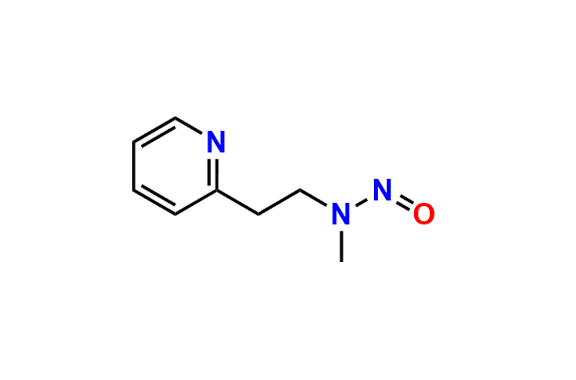N-Nitroso Betahistine
| CAT. No. | CP-B11004 |
|---|---|
| CAS. No. | 32635-81-7 |
| Mol. F. | C8H11N3O |
| Mol. Wt. | 165.19 |
| Stock Status | In Stock |
- Category: Impurity Standards
- Chemical Name: N-Methyl-N-(2-(pyridin-2-yl)ethyl)nitrous amide
FAQ
It is a nitrosamine impurity that can form during the synthesis, storage, or handling of Betahistine, a drug commonly used for balance disorders.
It is regulated due to its classification as a nitrosamine, which may pose health risks. Regulatory bodies like the FDA and EMA enforce limits on its levels in pharmaceuticals.
It forms when Betahistine interacts with nitrosating agents, especially under heat, moisture, or acidic conditions.
Formation can be managed by controlling storage conditions, pH levels, and using appropriate materials during production and packaging.
Techniques such as GC-MS, LC-MS, and HPLC-MS are employed for accurate detection and quantification of this impurity.
Chemicea supplies COA, H-NMR, MASS, HPLC, and TGA reports as standard, with additional reports like CNMR, IR, UV, DEPT, Water content, and CHNS available upon request.
Yes, they are accepted by regulatory agencies such as USFDA, EMA, ANVISA, TGA, PMDA, and other global health authorities.
N-Nitroso Betahistine is stable for shipping at room temperature, with specific storage guidelines provided in the COA.
Yes, Chemicea offers both standard and customized pack sizes to meet specific client requirements.
Chemicea provides N-Nitroso Betahistine as a reference standard, supporting method validation, impurity profiling, and regulatory compliance.


 VIEW COA
VIEW COA